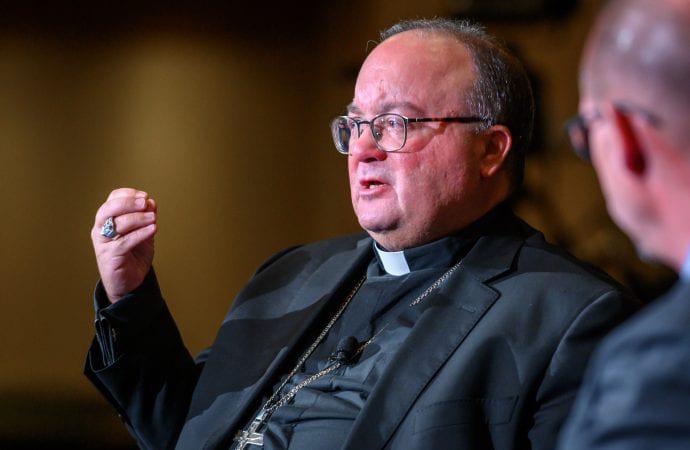|
Pope’s point man on abuse to U.S. Church: Be prepared for new revelations
By Christopher White
SOUTH BEND, Indiana - One of Pope Francis’s closest allies in fighting clergy sex abuse praised the American church for going “a step further” than the Vatican’s new global guidelines for bishop accountability by requiring a third-party reporting system, which is set to take effect next year. Archbishop Charles Scicluna of Malta, who serves as the adjunct secretary of the Vatican’s Congregation for the Doctrine of the Faith (CDF), said the U.S. Church had been “prophetic” in its response to the clergy abuse scandals nearly two decades ago in requiring all deacons, priests, and anyone who works with minors to undergo background checks and requiring independent diocesan audits. He also said, however, that the decision to exclude bishops from the same oversight in the Dallas Charter in 2002 was a “lacuna.” At the same time, in remarks at the University of Notre Dame on Wednesday, Scicluna warned that Americans must be prepared for further revelations similar to those in the 2018 Pennsylvania Grand Jury report, which chronicled decades of past abuse of minors at the hands of clergy, particularly as numerous states are undergoing their own similar investigations. “People need to be prepared for this narrative,” he cautioned. The Maltese archbishop participated in the university’s “‘Rebuild My Church’: Crisis and Response” forum, organized by Notre Dame President Father John Jenkins and moderated by Crux’s editor-in-chief John Allen, where he engaged in a town hall style forum with students on the clergy sexual abuse crisis. Throughout the 90-minute event, Scicluna returned to the theme of putting victims at the center of the Church’s response. In reflecting on 20 years of listening to abuse survivors, he said “I’m now quite convinced that in order to understand the egregious nature of the abuse by clergy, you have to meet with survivors.” “My experience of meeting victims is what I call ‘sacred ground,’” he added, saying there is a “spiritual dimension” to the abuse scandals and that solidarity with victims is “a way of being close to Christ’s suffering.” The archbishop, who served as one of the principal organizers of the February abuse summit at the Vatican when Pope Francis called the heads of every bishops’ conference in the world to Rome, in part to initiate a global consensus on the scope of the crisis, said that while he would have liked the fruits of it “to be more abundant,” he said that “in the Church, you learn to be patient.” He pointed to the speedy release of Vos Estis Lux Mundi, new Church law which makes it mandatory for all clerics and members of religious orders to report cases of clerical sexual abuse to Church authorities including when committed by bishops or cardinals, as one sign that the Church is hopefully turning the page in its handling of such cases. At several times during the event at Notre Dame, he reiterated that papal nuncios in each country would be essential to the implementation of the new norms if they are to be successful. Last June, just one month after Vos Estis was issued, Scicluna said he was invited by Francis to address nuncios from around the world as they gathered in Rome, where he said he challenged them that they “have to go after every bishop” to ensure that they deliver on implementing the new law. “I truly believe that the role of the papal representative in the country is to facilitate this reception,” he said, while acknowledging that there remains “difficulties in the culture” of certain countries in adopting such standards. The archbishop was asked several questions about two of the hot-button issues often discussed when trying to understand the root causes of abuse: Priestly celibacy and homosexuality - both of which he insisted are not causes for abuse. Instead, he encouraged a deepening of the understanding of the nature of chastity. “What we’re facing here is not only a deficit in the understanding of celibacy, but it’s also a betrayal of the commitment done before the people of God. There’s no nexus between misconduct and the law of celibacy,” he said. “In order to live chastely and celibately, you need to be in love with Jesus and the people of God,” he said of the Church’s requirement of mandatory celibacy of priests. “We will be chaste once we are truly in love,” he argued. “When you are truly in love, you take care of the people you love. You don’t abuse them.” Based on the data available, he said that the majority of victims of abuse are male and most are post-pubescent, but he refuted the idea that a homosexual orientation is a priori a root cause of abuse. “It’s always dangerous to blame it on a category of people,” he said Over the last two decades, Scicluna has been responsible for investigating some of the Church’s most notorious abusers, most notably Father Marcial Maciel Degollado, the founder of the Legion of Christ, who was revealed to be a serial abuser. He also led the investigation in Chile, where he produced a 2,300 report for Francis resulting in a major shift in the pope’s understanding of the situation there and which prompted the en masse resignation of the country’s Catholic bishops. As he concluded his remarks, Scicluna once more emphasized the need to put victim survivors at the center of the conversation, insisting that listening to their experiences is the necessary starting point for reform. “We will never get it right until we learn to listen to victim survivors. If we think we’re going to solve this without them, we’ll get it wrong,” he told the crowd. “They are not our enemies. They are brothers and sisters who are very hurt. They are part of us, and we are part of them.”
|
.
Any original material on these pages is copyright © BishopAccountability.org 2004. Reproduce freely with attribution.
